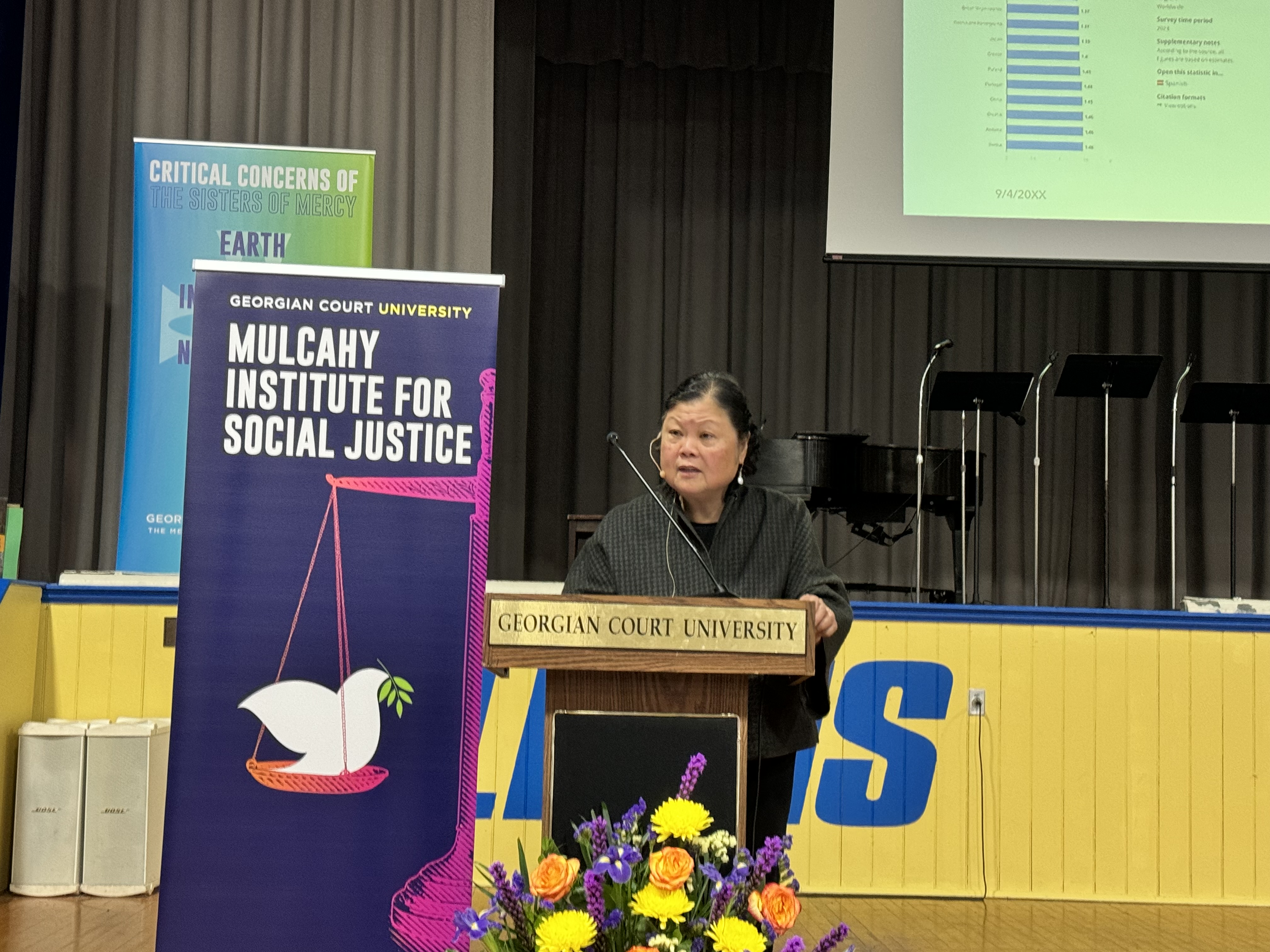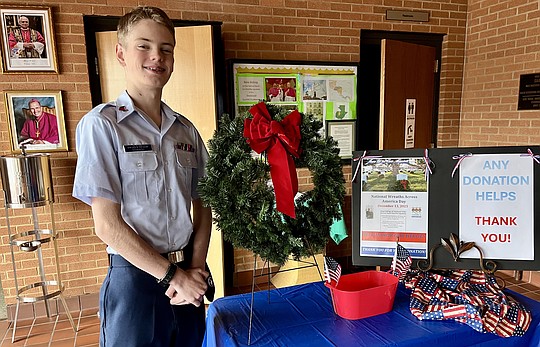Dr. Woo: Change hearts, do your part in responding to needs of migrants, refugees
May 7, 2024 at 4:00 p.m.
 Dr. Carolyn Woo, former president and CEO of Catholic Relief Services, speaks at the Critical Concerns Week at Georgian Court University, Lakewood. Photo courtesy of GCU
Dr. Carolyn Woo, former president and CEO of Catholic Relief Services, speaks at the Critical Concerns Week at Georgian Court University, Lakewood. Photo courtesy of GCU
People do not have to solve the world’s migration crisis, but they do need to see, listen and share with others, because migrants and refugees are people with rights, said the former president and CEO of Catholic Relief Services.
Dr. Carolyn Woo addressed the topic of refugee resettlement as part of this year’s Critical Concerns Week hosted by Georgian Court University in Lakewood earlier this Spring.
“Our ability to implement solutions is much closer than we think,” Dr. Woo said. “You don’t have a right to throw up your hands” when a problem seems overwhelming.
“Jesus asked each of us to change our hearts, not to solve all problems,” she noted.
Little Actions Count
In her keynote address, “Successful Refugee Resettlement: A Whole of Society Approach,” Dr. Woo posited that God did not ask the Good Samaritan to take care of everyone robbed along the road, but only the person the Samaritan passed. God did not ask the rich man to see everyone suffering, just to see Lazarus suffering at his door.
“Ask yourself ‘Did you do your part?’ We are all given a part in God’s work. We need to see ourselves as instruments of God’s work,” she said.
Dr. Woo urged everyone to “care about something,” noting that Mother Teresa did not see herself as being called to solve poverty, but to bring dignity to the person before her.
Her four steps to understanding migration and assisting immigrants were to let the facts speak, let God speak, let the migrant speak and let personal actions speak.
Speaking the Truth
To show how the treatment of refugees in the U.S. compares to that of the rest of the world, Dr. Woo explained that the U.S. is not even in the Top 10 countries hosting refugees. Eighty percent of refugees are housed by countries representing 19 percent of the world’s income, she said.
“The burden is not equally shared,” she said.
Forty-four percent of migrants coming across U.S. borders are turned away, said Dr. Woo. Migration is not necessarily a drain on a country’s resources. Economic research, including that done by the Brookings Institution, demonstrates the positive role immigrants play in strengthening the U.S. economy. In countries where the birthrate is decreasing, immigrants play an important role in keeping economies going.
She encouraged people to reframe their attitudes and language: Are immigrants assets or deficiencies, neighbors or invaders, people or problems?
Dr. Woo said when she was growing up, she thought world events had come to a point where people had learned all the bad lessons. There would be no more wars. There would be equality. But world events proved her wrong.
“We must accept that there will always be conflict and strife. We must be able to hold simultaneously that things get better, and things get worse,” she said.
Legacy of Mission
When asked what inspires her, Dr. Woo immediately answered: “People who are kind. Kindness is an affirmation that God is with us. We see kindness in children, in rich and poor. We see it in people on the right or the left in micro situations.”
Dr. Woo headed Catholic Relief Services from 2012 through 2016. Throughout many years of work as an educator, writer, and humanitarian, she has received many accolades, including being named one of the “Top Forty Leaders Under Forty” by Change Magazine; one of the 500 “Most Powerful People on the Planet”; and one of 33 in the category “A Force for Good” by Foreign Policy.
Jeff Schaffer, director of Mission and Ministry and Interim Executive Director of Mission Integration at GCU, explained that the Critical Concerns and Critical Values of the Sisters of Mercy are embedded into the university. As students, staff and visitors come through the main gate, they are greeted by banners spelling out these concerns: Earth, Immigration, Nonviolence, Racism and Women, and values: Justice, Respect, Integrity, Service and Compassion.
These are spotlighted during Critical Concerns Week when the GCU community focuses on one concern and one value. This year the week of March 18 was dedicated to Immigration and Compassion.
“One of the things that always strikes me when we kick off the Critical Concerns Week events is how much the issues are in the news. It speaks to the wisdom of the Sisters of Mercy and their sense of justice,” relates Schaffer.
He added, “As part of our mission statement, we hope students will transform the world. Catholic Social Justice teaching may be talked about as one of our best kept secrets but it’s not a secret here at Georgian Court University.”
Related Stories
Monday, December 15, 2025
E-Editions
Events
 Dr. Carolyn Woo, former president and CEO of Catholic Relief Services, speaks at the Critical Concerns Week at Georgian Court University, Lakewood. Photo courtesy of GCU
Dr. Carolyn Woo, former president and CEO of Catholic Relief Services, speaks at the Critical Concerns Week at Georgian Court University, Lakewood. Photo courtesy of GCU
People do not have to solve the world’s migration crisis, but they do need to see, listen and share with others, because migrants and refugees are people with rights, said the former president and CEO of Catholic Relief Services.
Dr. Carolyn Woo addressed the topic of refugee resettlement as part of this year’s Critical Concerns Week hosted by Georgian Court University in Lakewood earlier this Spring.
“Our ability to implement solutions is much closer than we think,” Dr. Woo said. “You don’t have a right to throw up your hands” when a problem seems overwhelming.
“Jesus asked each of us to change our hearts, not to solve all problems,” she noted.
Little Actions Count
In her keynote address, “Successful Refugee Resettlement: A Whole of Society Approach,” Dr. Woo posited that God did not ask the Good Samaritan to take care of everyone robbed along the road, but only the person the Samaritan passed. God did not ask the rich man to see everyone suffering, just to see Lazarus suffering at his door.
“Ask yourself ‘Did you do your part?’ We are all given a part in God’s work. We need to see ourselves as instruments of God’s work,” she said.
Dr. Woo urged everyone to “care about something,” noting that Mother Teresa did not see herself as being called to solve poverty, but to bring dignity to the person before her.
Her four steps to understanding migration and assisting immigrants were to let the facts speak, let God speak, let the migrant speak and let personal actions speak.
Speaking the Truth
To show how the treatment of refugees in the U.S. compares to that of the rest of the world, Dr. Woo explained that the U.S. is not even in the Top 10 countries hosting refugees. Eighty percent of refugees are housed by countries representing 19 percent of the world’s income, she said.
“The burden is not equally shared,” she said.
Forty-four percent of migrants coming across U.S. borders are turned away, said Dr. Woo. Migration is not necessarily a drain on a country’s resources. Economic research, including that done by the Brookings Institution, demonstrates the positive role immigrants play in strengthening the U.S. economy. In countries where the birthrate is decreasing, immigrants play an important role in keeping economies going.
She encouraged people to reframe their attitudes and language: Are immigrants assets or deficiencies, neighbors or invaders, people or problems?
Dr. Woo said when she was growing up, she thought world events had come to a point where people had learned all the bad lessons. There would be no more wars. There would be equality. But world events proved her wrong.
“We must accept that there will always be conflict and strife. We must be able to hold simultaneously that things get better, and things get worse,” she said.
Legacy of Mission
When asked what inspires her, Dr. Woo immediately answered: “People who are kind. Kindness is an affirmation that God is with us. We see kindness in children, in rich and poor. We see it in people on the right or the left in micro situations.”
Dr. Woo headed Catholic Relief Services from 2012 through 2016. Throughout many years of work as an educator, writer, and humanitarian, she has received many accolades, including being named one of the “Top Forty Leaders Under Forty” by Change Magazine; one of the 500 “Most Powerful People on the Planet”; and one of 33 in the category “A Force for Good” by Foreign Policy.
Jeff Schaffer, director of Mission and Ministry and Interim Executive Director of Mission Integration at GCU, explained that the Critical Concerns and Critical Values of the Sisters of Mercy are embedded into the university. As students, staff and visitors come through the main gate, they are greeted by banners spelling out these concerns: Earth, Immigration, Nonviolence, Racism and Women, and values: Justice, Respect, Integrity, Service and Compassion.
These are spotlighted during Critical Concerns Week when the GCU community focuses on one concern and one value. This year the week of March 18 was dedicated to Immigration and Compassion.
“One of the things that always strikes me when we kick off the Critical Concerns Week events is how much the issues are in the news. It speaks to the wisdom of the Sisters of Mercy and their sense of justice,” relates Schaffer.
He added, “As part of our mission statement, we hope students will transform the world. Catholic Social Justice teaching may be talked about as one of our best kept secrets but it’s not a secret here at Georgian Court University.”










